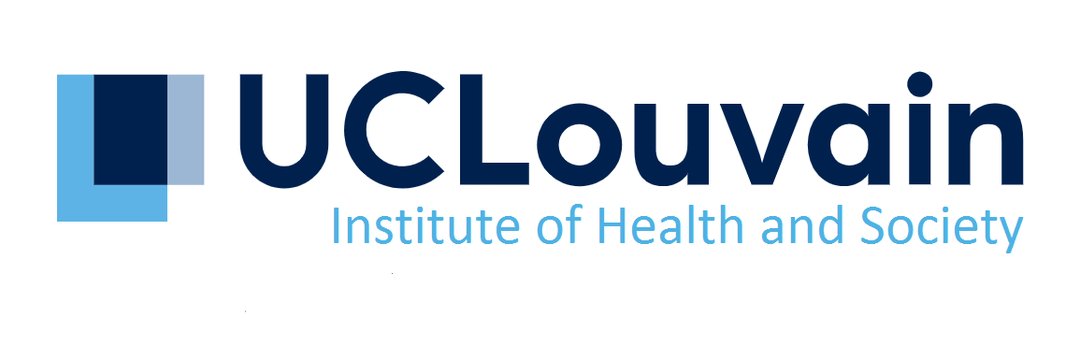IRSS Seminar - Change in the crude death rate in Yemen : lesson from Complex Emergency Database (CEDAT) (May 2020)
By Thomas Ogbu
Location: Brussels, Belgium
For more information, contact thomas.jideofor@uclouvain.be.
IRSS Seminar - Supportive Risk Awareness and Communication to Reduce Impact of Cross-Border Heatwaves (January 2020)
By dr. Kirsten Vanderplanken
Location: Brussels, Belgium
For more information, contact kirsten.vanderplanken@uclouvain.be.
IRSS Seminar - Supportive Risk Awareness and Communication to Reduce Impact of Cross-Border Heatwaves (December 2019)
By dr. Maria Rodrigues Leal Moitinho De Almeida
Location: Brussels, Belgium
For more information, contact maria.rodrigues@uclouvain.be.
Journée des doctorants (fédération wallonie-bruxelles): Prize of best oral presentation (December 2019)
By dr. Maria Rodrigues Leal Moitinho De Almeida
Location: Brussels, Belgium
For more information, contact maria.rodrigues@uclouvain.be.
Keynote presentation Asia-Pacific Regional NGO Partnerships week (November 2019)
By Prof. Debarati Guha-Sapir
Location: Bangkok, Thailand
For more information, contact contact@cred.be.
Results from key informant interviews on European heatwave plans - SCORCH project, EPH conference (November 2019)
By dr. Kirsten Vanderplanken
Location: Marseille, France
For more information, contact kirsten.vanderplanken@uclouvain.be.
Weather characteristics of hazards resulting in a human disaster, Herrenhauser conference (October 2019)
By Rémi Froment
Location: Hannover, Germany
For more information, contact remi.froment@uclouvain.be.
European Society of Emergency Medicine (EUSEM), Heatwaves & health (October 2019)
By dr. Joris van Loenhout
Location: Prague, Czech Republic
For more information, contact joris.vanloenhout@uclouvain.be.
Catastrophe naturelle, conflits armés et accès à l’eau, Congrès de la Société franchophone de néphrologie dialyse et transplantation (SFNDT) (October 2019)
By Prof. Debarati Guha-Sapir
Location: Nancy, France
For more information, contact contact@cred.be.
Keynote Speech, Day of the German Academy for Public Health. "Near future challenges for starting public health professionals in Germany" (September 2019)
By dr. Maria Rodrigues Leal Moitinho De Almeida
Location: Dusseldorf, Germany
For more information, contact maria.rodrigues@uclouvain.be.
Global health inspiration Day (September 2019)
By Prof. Debarati Guha-Sapir
Location: Oslo, Norway
For more information, contact contact@cred.be.
Technical Advisory Group Meeting - 24-25th of October 2016
Location: Washington D.C., U.S.A.
The discussion will focus on the following topics:
- The improvement of the EM-DAT database
- Collaborative data exchange and users feedbacks
- Mortality and economic losses data reporting
- Georeferencing disasters
Workshop on heat and health: Activities in Belgium and the Netherlands - 9th of September 2016
ENHANCE Workshop
Location: Fondation Universitaire, Brussels, Belgium
The basis for this workshop is CRED’s work on a case study on heat and health within the ENHANCE project - a European initiative to enhance risk management partnerships for catastrophic natural hazards in Europe. The main aim of this workshop is to present results from CRED’s different sub-studies, and bring together relevant stakeholders from Belgium and the Netherlands.
For more information, contact joris.vanloenhout@uclouvain.be.
Framing Community Disaster Resilience: resources, capacities, learning and action - 9th of September 2015
emBRACE Project Conference
Location: King’s College, London, U.K
The aim of the emBRACE project conference was to present the combined findings of the emBRACE project to a delegation of engaged stakeholders and policy makers. The focus of the day was on reporting the work undertaken during the project through a range of presentations and interactive learning sessions. An additional perspective was presented by guest speakers whose insights - gained from their own community resilience research - grounded emBRACE into a wider understanding of community resilience and provided opportunities for the development of future collaborations and resilience research agendas.
For more information, contact bernadette.dubus@uclouvain.be
Expert Consultation on Sustainable Disaster Databases for South and South-East Asia - 11-13th of December 2012
CRED Meeting with support from the United States Agency for International Development/Office of US Foreign Disaster Assistance (USAID/OFDA), the Global Facility for Disaster Reduction and Recovery (GFDRR) and the World Bank.
Location: Hotel Plaza Athénée in Bangkok, Thailand
Participants explored disaster database models that are technically and financially sustainable in countries of South and Southeast Asia. The agenda also included exploratory consultations for the creation of a consortium to sustainably strengthen the availability and technical quality of disaster data.
For more information, contact regina.below@uclouvain.be.
Presentation of 2012 Disaster Data (Asia) - 11th of December 2012
CRED/UN ISDR Press Conference
Location: Bangkok, Thailand
An early view of disaster trends in 2012 across Asia - the world’s most disaster-prone region - showed that floods and storms remained the main threats in Asia throughout 2012, as indicated in the Philippines, where Typhoon Bopha resulted in 500 deaths. Floods accounted for 54% of the death toll in Asia, 78% of people affected and 56% of all economic damages in the region. Pakistan suffered large-scale loss of life from floods for the third successive year as 480 people died in floods between August and October. Floods in China (June-July) affected over 17 million people and caused the highest economic losses (US $4.8 billion).
On a more positive note, the report showed that Asian disaster figures in 2012 were low compared to other years. It also appeared that some high risk countries in the region have made significant progress in controlling disaster impacts, indicating that preparedness and prevention measures can be effective.
For more information, contact regina.below@uclouvain.be.
'Can evidence save lives? Perspectives from humanitarian actors' - 19th of July 2012
UN ECOSOC Meeting
Location: United Nations in New York, U.S.A.
CRED and the European Commission DG ECHO joined the debate on whether or not data and evidence can save lives. The policy debate discussed the following questions:
- Are humanitarian operators overwhelmed by the demands to provide hard evidence, and should it be their role?
- Is there case for better exploiting operational data from humanitarian actors?
- How can evidence be better linked to decision making?

